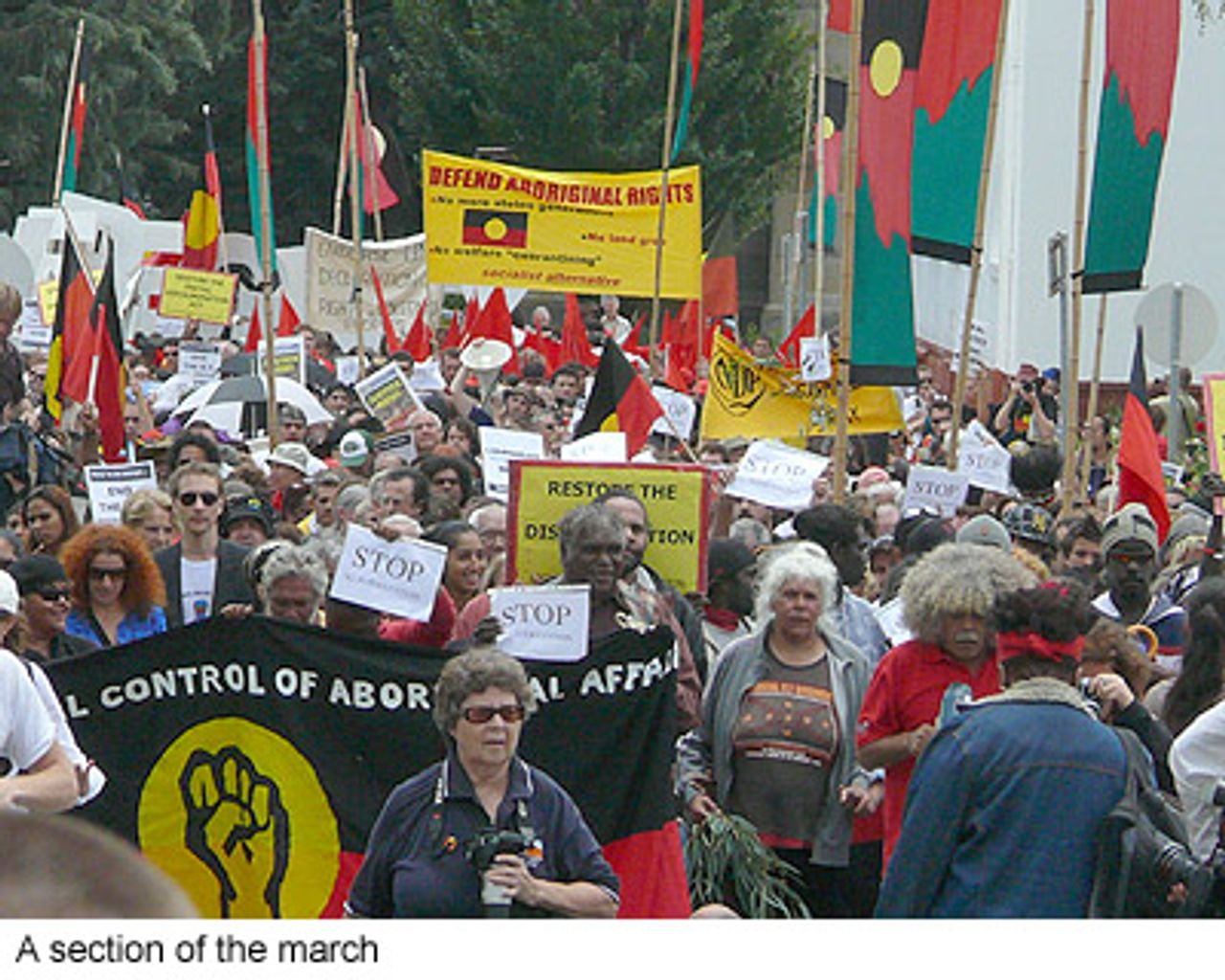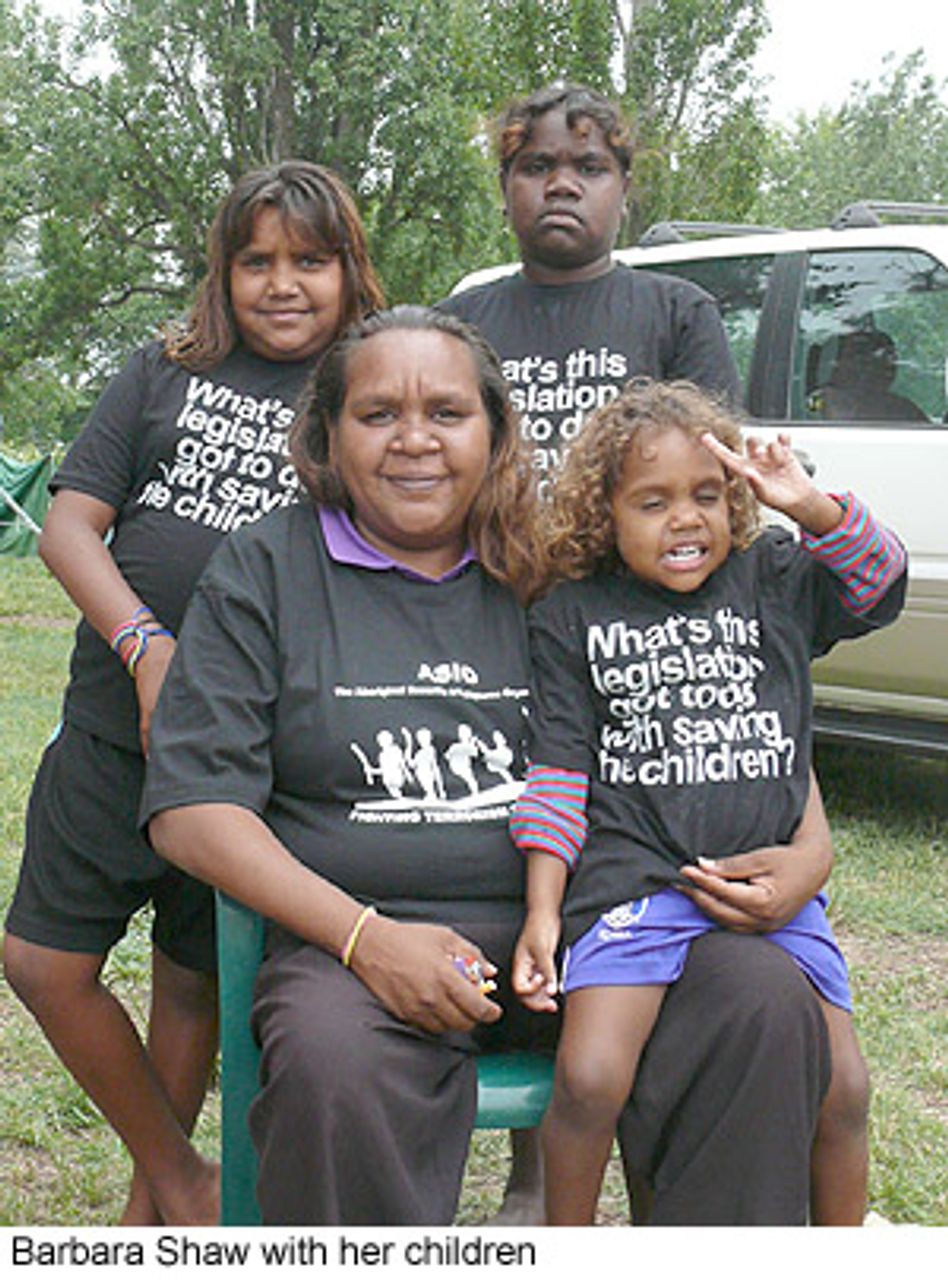Over the past week the local media has bombarded Australians with gushing praise for the Rudd government’s apology to members of the “stolen generations”—the Aboriginal and “half-caste” children who were forcibly removed from their parents by government authorities from 1900 to the early 1970s. Lofty editorials, endless commentaries and extensive radio and television broadcasts have hailed Prime Minister Kevin Rudd for allegedly “healing past wounds” and “bringing the nation together”.
The real attitude of the media and political establishment toward the desperate conditions facing indigenous Australians, however, was on display less than 24 hours before Rudd delivered his formal apology.
The day before the nationally televised “sorry” events, nearly 2,000 Aborigines from across the country gathered in Canberra to protest the federal government’s Northern Territory (NT) police-military intervention.
Demonstrators came from all Australian states—some visiting the national capital for the first time in their lives. Many arrived not to hear Rudd’s apology, but to protest the Labor government’s ongoing support for the takeover of Aboriginal communities in the NT.
Yet, virtually all coverage of the February 12 protest was suppressed. Apart from brief reports by some news networks on Tuesday night and a perfunctory article in the local Canberra Times, the demonstration—a significant national event—went largely unreported.
The reason for this silence is not difficult to fathom. Labor’s ongoing support for the NT intervention—launched by the previous Howard government just over six months ago—refutes all pretensions that Rudd’s apology represents a departure from past crimes and a fresh beginning for the Aboriginal people.
Any objective reporting of Tuesday’s protest would have exposed the ugly face of the NT intervention and cast an unacceptable pall across the national image being projected by the media and political elite.
Tuesday’s demonstrators, led by about 20 Aborigines from the Northern Territory, marched to the lawns outside federal parliament chanting, “Stop the intervention, human rights for all”. Marchers carried placards denouncing the takeover of some 72 Aboriginal townships and missions.
Among those speaking from the platform at the rally was Barbara Shaw from Tangentyere Council, which administers the town settlements around Alice Springs. She told protestors: “I’m a fourth generation town-camper and my kids are the fifth. The old people back home they don’t want us living the same lifestyles that they had to put up with.”
Many of those who had travelled from the Northern Territory addressed the crowd. While their comments were brief, they provided a glimpse of how the intervention, mounted on the pretext of protecting Aboriginal children from abuse, has impacted on dozens of Aboriginal communities. Among the measures they denounced was the “quarantining” of welfare payments—the government’s Centrelink agency is withholding half the benefits of every resident and forcing them to obtain an identity card to purchase food and other essential items from nominated retail outlets.
Frank Djirrimbilpilwuy from Elcho Island directed his remarks to the media and its false portrayals of indigenous people. “First of all the media must put down exactly what we say. I’m a broadcaster, so don’t tell me you have your protocols. I want you to get what we say right. We came here for a reason and want to talk about the problems we’re having because of the intervention. This is a historic moment for our people and we want this intervention to stop.”
Aunty Valerie from Yuendemu, which is north-west of Alice Springs, denounced the intervention. “We know how to look after our kids,” she said. “We don’t want to be treated like animals. We want to be treated like human beings.”
Another man said. “We have come to this parliament because we want to talk to the Rudd government to stop this intervention. We call it an invasion. I’ve just rung up my mob at home and they have nothing. They have to walk miles to get to Centrelink to get a ration card or whatever they call it. They can only shop at Woolworths or Coles and then they have to walk back home again. This is a bad shame.”
Walter Shaw from Tangentyere Council was cheered when he said: “This intervention is racially vilifying and demonising our communities—that women neglect their children; that men abuse their children and that Aboriginal men and women are chronic alcoholics.
“We want to move forward but this intervention feels like the last nail in the coffin for our people. We want to maintain our cultural existence and existences as Aboriginal people but we want to move forward so we can live side by side with all Australians... This intervention was supposed to be an idealistic vision from [former Howard minister] Mal Brough. He is no longer in his seat in parliament. This intervention should have been thrown out, along with him.”
Kathleen Martin, 73, who lives 25 kilometres outside Alice Springs, said her pension was now being “managed” by the government. “I paid taxes and tried to lead a good life but now I’ve been income-managed and they couldn’t give me a reason why. This is wrong and I’ve come down here to oppose this intervention.”
Another man explained that he lived 30 kilometres from Alice Springs, and like hundreds of other Aborigines in the areas now under military management, had to walk or hitchhike into town “to get the welfare shopping card, do my shopping and then, because I have no cash, walk home”. Other speakers warned that the intervention would be used against Aborigines throughout Australia.
Aaron, a welfare worker from Alice Springs, told the crowd that the government was turning the clock back to the days of ration cards. “The older generation has experienced this sort of thing before but these children here should not,” he said. “This intervention cannot go on. Why should we have to fight red tape to get access to our own money? Why should have to beg or borrow—we are not children getting pocket money; we are not animals to be told what to do?”
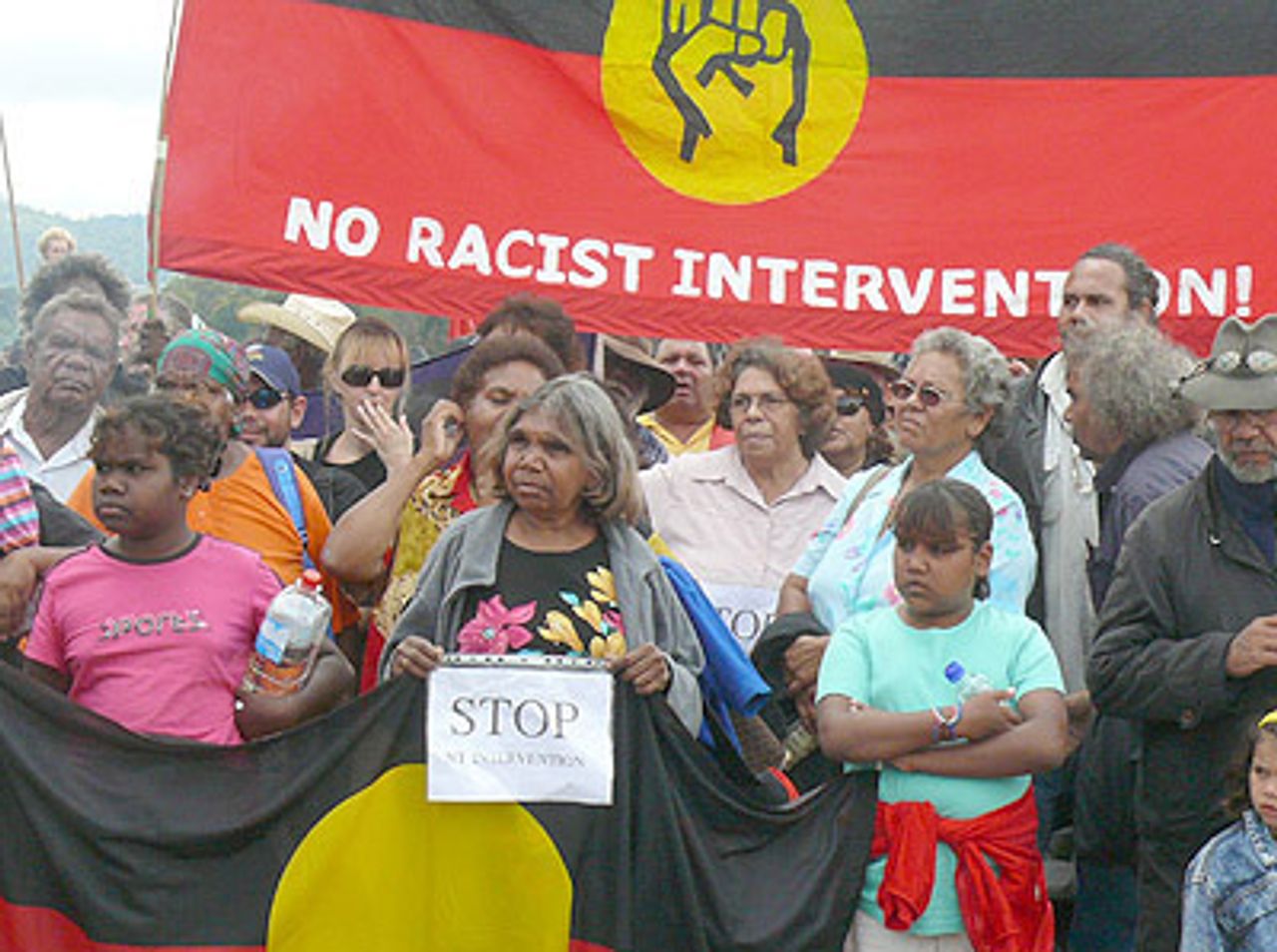
Not a single Labor MP spoke at the protest, underscoring the Rudd government’s firm intent to maintain the NT takeover. Nevertheless, no-one in the Aboriginal leadership was prepared to condemn the Rudd government. Greens leader and federal senator Bob Brown and Australian Democrat Andrew Bartlett each praised Rudd’s planned “apology” and fostered illusions that Labor could be pressured to adopt progressive measures.
Brown, for example, hailed the Rudd government for inviting Aborigines to open the federal parliament with a traditional welcome ceremony on February 11 and claimed the formal apology to the stolen generations was “an important first step”.
Yesterday, speaking in federal parliament, Indigenous Affairs Minister Jenny Macklin rebutted accusations from opposition shadow minister Tony Abbott that Labor plans to “water down” the NT legislation. Macklin assured the opposition that almost 6,000 people were currently being “income-managed” and that, along with existing military personnel, an additional 66 Australian Federal Police would be deployed to Aboriginal communities in the NT over the next two years.
* * *
World Socialist Web Site reporters spoke with some of those attending the February 12 demonstration.
Eric from Titkikala near Alice Springs denounced the government’s NT intervention: “I don’t agree with this intervention at all. We call it an invasion. They say it is to help Aboriginal people, but it doesn’t help them at all. They now control half our welfare and can cut it when they feel like it. Women and kids are going to be starving and hungry.
“The police are even stopping people coming into town from the bush to get hospital care. Everybody’s money has been cut back and so some people have had to use unregistered cars to get there. The police pull them over and charge them with driving unregistered vehicles. Seven hundred and thirty people have been booked for this—some people have had to travel hundreds of miles to get to hospital. This has been going on since last year. Police have also raided some communities looking for drugs and thrown their gear outside. Nothing has been found, it’s just harassment.”
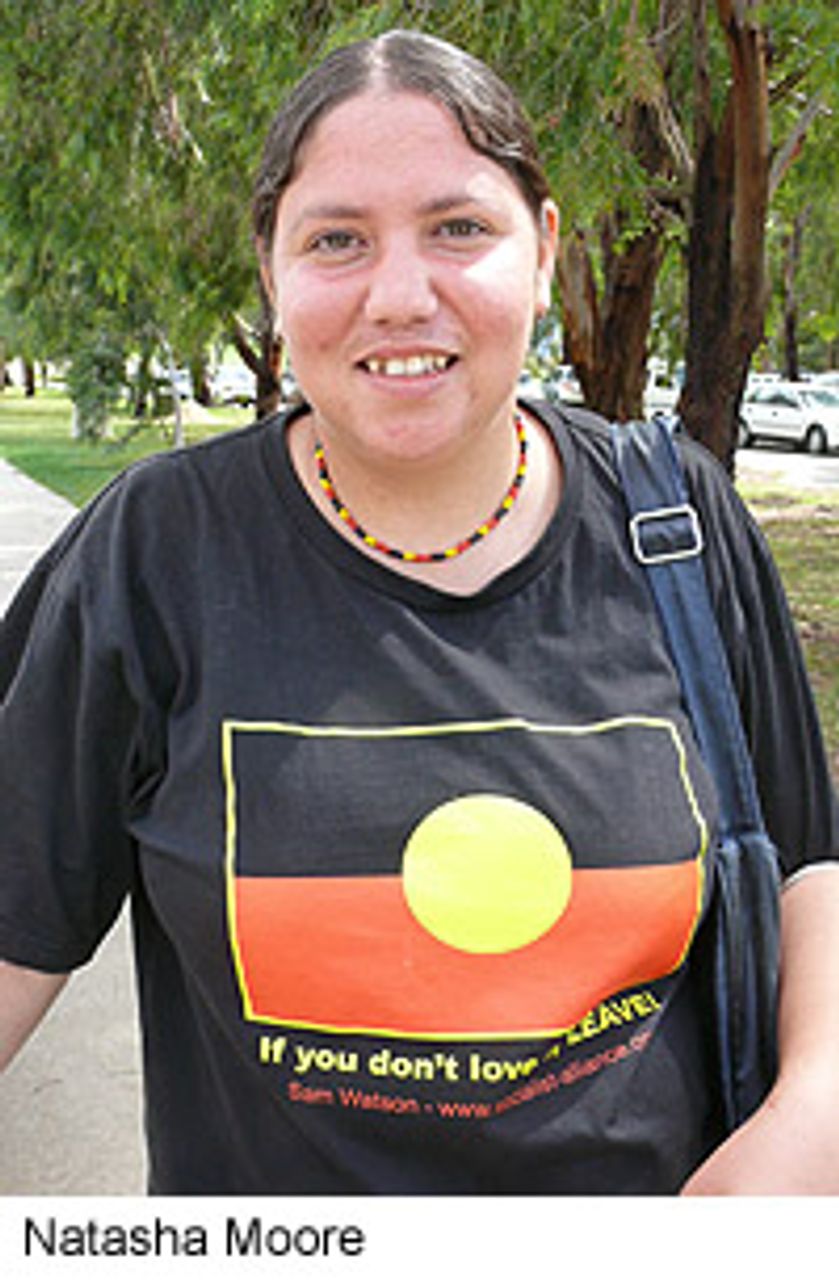
“Aboriginal people in the remote areas have no access to health, to proper community welfare or agencies to help with alcohol and other problems. Just banning alcohol doesn’t stop the problem. You have to treat the underlying issues—the poverty, unemployment and despair. I was really shocked and angry when I found out what the intervention meant.
“I was surprised that Labor supported this. I thought they had a different agenda. The apology is a good thing in trying to establish a proper relationship between Aboriginal and non-Aboriginal people in Australia. But how can this be properly done if they keep this military intervention? How fair is that? And there has to be compensation for the stolen generations. I’ve heard stories about how babies were taken away from their families. These were horrible crimes and had a terrible effect on people. The government had no right to do this to the original inhabitants of this land.
“What needs to be done is to allow indigenous people to have control over their own lives—to have real equality and to have proper jobs and all the facilities that are necessary for families to have a decent life. Alcoholism and drug abuse is a problem in Aboriginal communities because there are many other underlying issues and unless these are honestly recognised by the government and real help provided nothing will change.”
On February 13, the day of Rudd’s apology speech, WSWS reporters spoke to participants in the previous day’s protest.
Barbara Shaw is an executive member of Tangentyere Council. “I don’t understand why they didn’t report our march yesterday against the NT intervention. We get more international coverage than coverage here. Last year we were interviewed from France, Germany and Italy.
“I want Rudd to go to all the communities. All our camps are dirty and run down but we try and do the best we can without any resources. We need proper housing, healthy living, education and we need high schools in the remote communities. There is only one in Wave Hill.”
Harry Jagamara Nelson is the head of the Community Council at Yuendumu. “We need to be hitting the government repeatedly till they change course to stop the intervention. All the intervention has provided us is 100 rakes to clean up the place. That’s it. The welfare quarantining has not started at our community yet. You know they are even quarantining old age pensioners.
“It’s wrong what happened in the early days—children taken away from their parents—and it’s right they said sorry but it will never take away the memories. We hope this [gathering] will stop the NT intervention. Today we are talking to the Senate Committee. We want to persuade them to roll it back.”
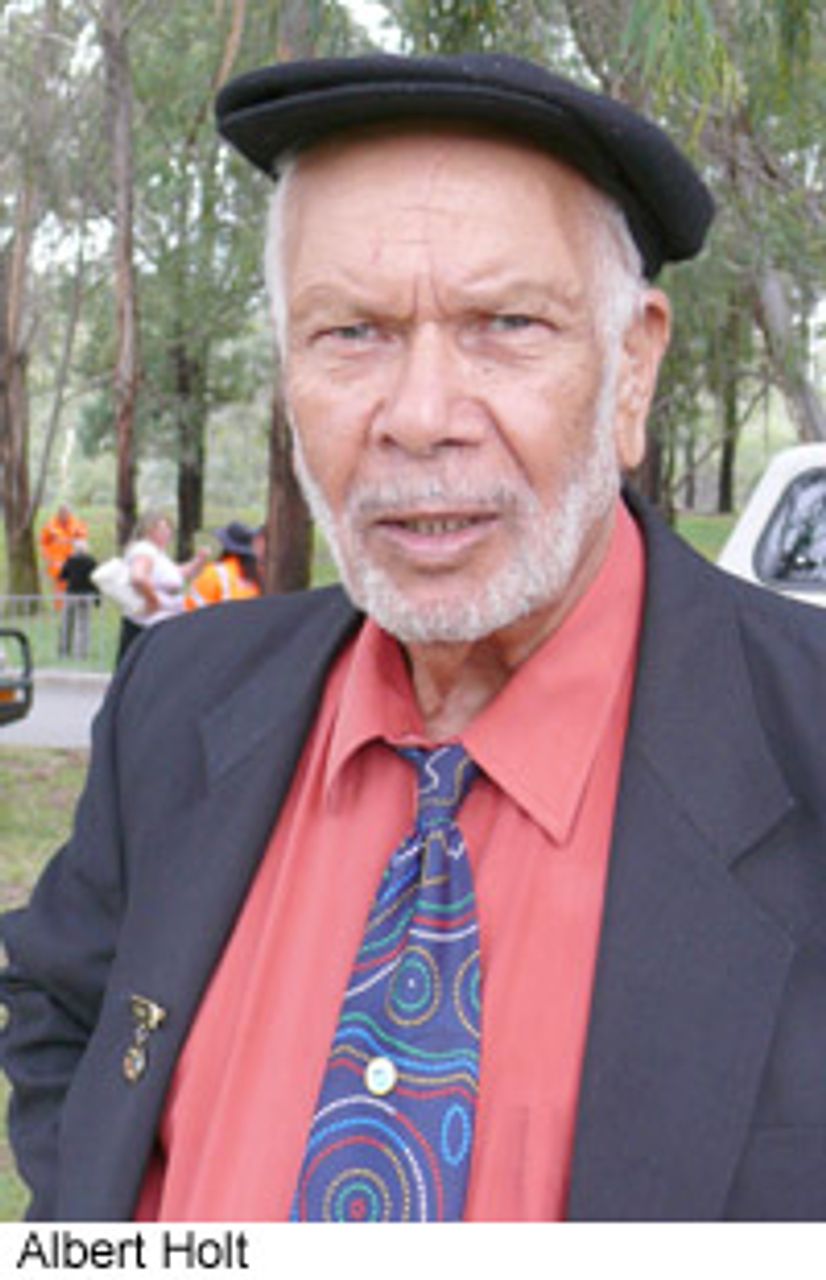
“Nobody condones the sexual mistreatment of children and similar sort of behaviour that was referred to in the government report and in the media about the situation in the Northern Territory. It’s wrong but I disagree with the military intervention because it’s just over the top.
“It must be terrifying to have the military and police going around these communities with no restraints and restrictions on what they do to people. I just wonder if there were white communities with the same problem whether the government would send in the military. Quarantining welfare is going to lead to increased numbers of Aborigines being incarcerated in prisons and that will only cost the taxpayers even more.”

